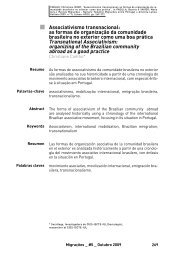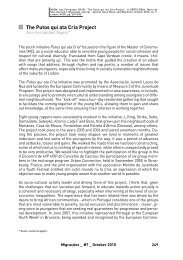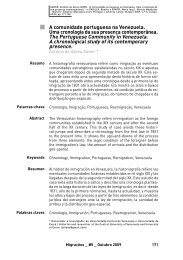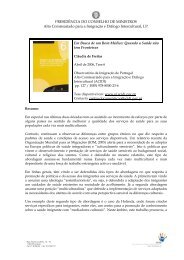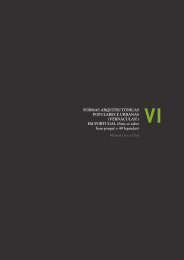<strong>in</strong> which man participates. From family, commune organised adm<strong>in</strong>istratively <strong>in</strong> freguesias<strong>and</strong> municípios, pr<strong>of</strong>ession organised <strong>in</strong> corporations <strong>in</strong>clud<strong>in</strong>g associations<strong>of</strong> employees <strong>and</strong> employers, to nation <strong>and</strong> church, respect<strong>in</strong>g a hierarchy <strong>of</strong> socialaims from <strong>the</strong> substance to <strong>the</strong> spiritual, <strong>and</strong> from <strong>the</strong> particular to <strong>the</strong> general,tak<strong>in</strong>g <strong>the</strong> national <strong>in</strong>terest as <strong>the</strong> supreme expression <strong>of</strong> <strong>the</strong> common welfare. It is<strong>the</strong> ideology <strong>of</strong> <strong>in</strong>tegral nationalism. In juridical terms, accord<strong>in</strong>g to Marcelo Caetano,<strong>the</strong> next prime m<strong>in</strong>ister, this means <strong>the</strong> <strong>in</strong>tegration <strong>of</strong> all modes <strong>of</strong> social life <strong>in</strong>to <strong>the</strong>nation – furnished with <strong>the</strong> juridical means necessary to <strong>the</strong> realisation <strong>of</strong> its ownaims – <strong>in</strong> <strong>the</strong> political constitution <strong>of</strong> <strong>the</strong> state (1941:55). In a military conceptualisation,so much <strong>in</strong> <strong>the</strong> taste <strong>of</strong> Estado Novo, <strong>the</strong> nation was presentedas “an armythat marches, animated by <strong>the</strong> spirit <strong>of</strong> unity, to <strong>the</strong> realisation <strong>of</strong> <strong>the</strong> common ideal”(1941:133, <strong>in</strong> Côrte-Real, 2000:24). With such a strategy, <strong>the</strong> state controlled everys<strong>in</strong>gle movement <strong>of</strong> society, deliberately shap<strong>in</strong>g, as Salazar stressed <strong>in</strong> 1929, a newspirit <strong>and</strong> a new mentality (Salazar, 1961:38). The universality <strong>of</strong> state functions wasclearly mentioned by <strong>the</strong> dictator <strong>in</strong> a 1930 speech about <strong>the</strong> fundamental pr<strong>in</strong>ciples<strong>of</strong> <strong>the</strong> revolution: “<strong>the</strong> state has <strong>the</strong> right to promote, harmonize <strong>and</strong> control all nationalactivities” (1961:81, <strong>in</strong> Côrte-Real 2000:24). The highly hierarchical system necessaryto operate <strong>the</strong> “national renaissance” (Ferro, 1933:xxxv) was constructed over<strong>the</strong> notion <strong>of</strong> a m<strong>in</strong>dless Portuguese people, “a mass <strong>of</strong> men anxious for comm<strong>and</strong><strong>and</strong> protection, good for all k<strong>in</strong>ds <strong>of</strong> enterprise, so sacrificed for so many adventures”(Caetano, 1941:34, <strong>in</strong> Côrte-Real, 2000:27).Cultural policy represented a central concern <strong>of</strong> Estado Novo. Promoted by políticado espírito, it was <strong>in</strong>troduced <strong>in</strong>to <strong>the</strong> Portuguese scenario by <strong>the</strong> journalist AntónioFerro, <strong>in</strong> a famous series <strong>of</strong> <strong>in</strong>terviews with Salazar <strong>in</strong> 1932. The concept <strong>of</strong> política doespírito was a central European construct whose orig<strong>in</strong>s were reported to reach backto Napoleon’s writ<strong>in</strong>gs. Ferro traces <strong>the</strong> implementation <strong>of</strong> <strong>the</strong> concept <strong>in</strong> its variousapproaches, stress<strong>in</strong>g <strong>the</strong> Russian <strong>and</strong> <strong>the</strong> Italian cases, foresee<strong>in</strong>g its implementationwith<strong>in</strong> <strong>the</strong> Portuguese political context. “In France, <strong>in</strong> Italy, <strong>in</strong> Russia, <strong>in</strong> Germany,<strong>in</strong> Engl<strong>and</strong> <strong>and</strong> even <strong>in</strong> <strong>the</strong> Balkans, <strong>the</strong> State acknowledges <strong>the</strong> Policy <strong>of</strong> <strong>the</strong> Spirit<strong>and</strong> realizes it, with amplitude, morally <strong>and</strong> materially protect<strong>in</strong>g all <strong>the</strong> literary <strong>and</strong>artistic <strong>in</strong>itiatives” (Ferro, 1933:274). Not<strong>in</strong>g <strong>the</strong> political importance <strong>of</strong> musical expressionas a privileged mov<strong>in</strong>g force for human emotions Ferro stressed that: “<strong>of</strong> all<strong>the</strong> arts, music is <strong>the</strong> one that exercises greatest <strong>in</strong>fluence <strong>in</strong> <strong>the</strong> passions, <strong>the</strong> onethat <strong>the</strong> legislator should most encourage” (1933:275, <strong>in</strong> Côrte-Real, 2000:83). Withthis purpose <strong>in</strong> m<strong>in</strong>d, Ferro would pay particular attention to musical expression <strong>in</strong>Portugal. Music, especially with literary text, <strong>and</strong> <strong>fado</strong> <strong>in</strong> particular, would occupy amean<strong>in</strong>gful place with<strong>in</strong> <strong>the</strong> cultural policy <strong>of</strong> Estado Novo. Shaped by its conservativecharacter, <strong>the</strong> governmental awareness <strong>of</strong> <strong>the</strong> powers <strong>of</strong> musical expressionwould <strong>in</strong>evitably promoted its stagnation at various levels.Dur<strong>in</strong>g World War II <strong>and</strong> <strong>in</strong> post-war times, <strong>fado</strong> was used as a propag<strong>and</strong>a tool toillustrate <strong>the</strong> “peaceful” existence <strong>of</strong> <strong>the</strong> Portuguese people. Deprived <strong>of</strong> criticalviews, thanks to tight censorial action, it was presented as <strong>the</strong> sweet popular urbanexpression <strong>of</strong> Portuguese attraction. The image broadcasted by <strong>the</strong> governmentthrough <strong>the</strong> book Vacances avec Salazar by <strong>the</strong> French journalist, <strong>of</strong> Belgian orig<strong>in</strong>,Christ<strong>in</strong>e Garnier <strong>in</strong> 1952, stresses his love for <strong>fado</strong> <strong>and</strong> <strong>the</strong> policy <strong>of</strong> <strong>the</strong> spirit as a86 Music <strong>and</strong> Migration
condition for national reconstruction. 15The generalised stagnation, systematically <strong>in</strong>fused, was valued for tourist policypurposes. The full-page ad by Swissair <strong>in</strong> <strong>the</strong> New York Times travel section on18.02.1966 stat<strong>in</strong>g “Portugal is Europe before it changed” is illustrative. A small textalludes to <strong>fado</strong> as “<strong>the</strong> beautiful songs <strong>of</strong> Portuguese women... heard <strong>in</strong> cafes” <strong>and</strong>to “<strong>the</strong> old fishermen mend<strong>in</strong>g nets...”. The strategy, to attract those <strong>in</strong>terested <strong>in</strong><strong>the</strong> eventual exotic purity <strong>of</strong> life <strong>in</strong> a poor European past, must be seen as a justificationfor <strong>the</strong> overall backlog <strong>of</strong> <strong>the</strong> country. Spread through so efficient channels, <strong>the</strong>valorisation <strong>of</strong> past constructs, repertoires <strong>and</strong> practices, as pure <strong>and</strong> true nationalrepresentations, would leave deep <strong>in</strong>fluences on <strong>the</strong> imag<strong>in</strong>ary <strong>of</strong> many Portuguesewho learned to associate with Portuguese identity.The over emphasis on past <strong>fado</strong> repertoires was observable <strong>in</strong> <strong>the</strong> migrant group <strong>in</strong>Newark. There was a strong reaction aga<strong>in</strong>st <strong>in</strong>novation. Local fadistas built <strong>the</strong>irrepertoires out <strong>of</strong> old <strong>fado</strong>s, <strong>the</strong> so called “true”, “traditional” <strong>and</strong> “typical” ones; visit<strong>in</strong>gfadistas <strong>in</strong>vited from Portugal were usually selected from among <strong>the</strong> older performers<strong>and</strong> those who sang <strong>the</strong> older <strong>fado</strong>s; <strong>the</strong> records <strong>and</strong> cassettes sold <strong>in</strong> <strong>the</strong>stores also featured old fadistas, some already retired or even dead. The negation <strong>of</strong><strong>in</strong>novation was clearly stated by participants:“People come here to hear old <strong>fado</strong>s <strong>and</strong> songs, <strong>the</strong>y don’t want to hear new th<strong>in</strong>gs. I don’tgive <strong>the</strong>m old <strong>fado</strong>s because <strong>the</strong>y ask for <strong>the</strong>m. I give because I don’t s<strong>in</strong>g new songs, ok!?I refuse to s<strong>in</strong>g new <strong>fado</strong>s, <strong>the</strong>y have no mean<strong>in</strong>g for me. And so I feel f<strong>in</strong>e, because I knowthat I’m go<strong>in</strong>g to s<strong>in</strong>g for <strong>the</strong>m what <strong>the</strong>y like to hear. Someth<strong>in</strong>g that makes <strong>the</strong>m rememberold days, <strong>the</strong>ir childhood, <strong>and</strong> <strong>the</strong>ir homel<strong>and</strong>.” (Miguel Valente, personal <strong>in</strong>terview,Newark, 24.03.1990, <strong>in</strong> Carvalho, 1991:81).The strange reaction <strong>of</strong> <strong>the</strong> participants, avoid<strong>in</strong>g references to <strong>the</strong> famous <strong>fado</strong> s<strong>in</strong>gersAmália Rodrigues <strong>and</strong> Carlos do Carmo, even when asked about great voices<strong>and</strong> <strong>the</strong>ir <strong>in</strong>fluential effects, may have also been determ<strong>in</strong>ed by <strong>the</strong> <strong>in</strong>novative actionthat <strong>the</strong>se two s<strong>in</strong>gers represented regard<strong>in</strong>g <strong>the</strong> <strong>fado</strong> repertoire. Both <strong>of</strong> <strong>the</strong>m did<strong>in</strong>deed br<strong>in</strong>g novelty to <strong>fado</strong>, challeng<strong>in</strong>g its identity. Carlos do Carmo did it on purpose,replac<strong>in</strong>g <strong>fado</strong>’s image <strong>of</strong> man <strong>in</strong> society. His record Um Homem na Cidade (LP,UPAV 1977) (União Portuguesa de Artistas de Variedades) illustrates this perspective.It considers democratic policy concerns <strong>and</strong> promotes <strong>citizenship</strong>; po<strong>in</strong>ts to <strong>in</strong>novation<strong>in</strong> <strong>the</strong> lyrics, by José Carlos Ary dos Santos, with new <strong>and</strong> appeal<strong>in</strong>g visions<strong>of</strong> <strong>the</strong> city; <strong>and</strong> <strong>in</strong>novative use <strong>of</strong> sound material, with some melodic, harmonic <strong>and</strong>formal challenge. This <strong>in</strong>novative sonic doma<strong>in</strong>, referred to as <strong>fado</strong> novo (new <strong>fado</strong>)<strong>in</strong> <strong>the</strong> migrant community, was l<strong>in</strong>ked with <strong>the</strong> image <strong>of</strong> <strong>the</strong> sounds <strong>of</strong> April, from <strong>the</strong><strong>in</strong>tervention songs emerg<strong>in</strong>g dur<strong>in</strong>g <strong>the</strong> 1974 Portuguese Revolution. 16Amália Rodrigues, on <strong>the</strong> o<strong>the</strong>r h<strong>and</strong>, although hav<strong>in</strong>g <strong>in</strong>troduced some <strong>in</strong>novation to<strong>fado</strong> on purpose, was <strong>in</strong> her own words surprised by <strong>the</strong> op<strong>in</strong>ion <strong>of</strong> those who heardher performances. Amália stressed that it was her audiences who <strong>in</strong>troduced <strong>the</strong>major <strong>in</strong>novation to <strong>the</strong> <strong>fado</strong> def<strong>in</strong>ition. They termed all <strong>the</strong> songs she sung as <strong>fado</strong>.Migrações _ #7 _ October 201087





